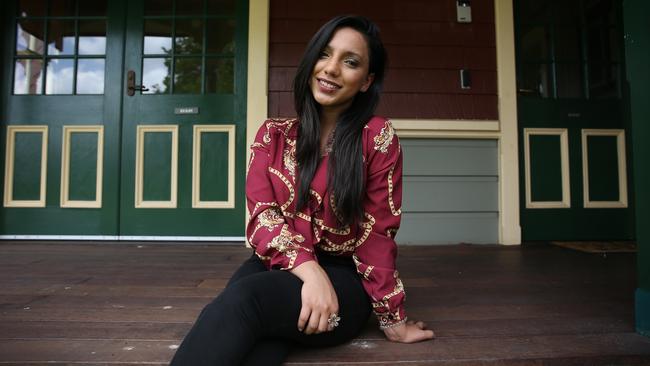
Ex-Muslim Zara Kay was just eight years old when she put on the hijab, and 18 when she moved to Australia, and eagerly took it off.
“People asked me: have you been paid by the Jews?” she says of her decision to renounce Islam.
“I’ve heard other people say: is this about your virginity? If you’ve lost it, we can pay to have that fixed and you can come back to Islam.”
Kay, 26, doesn’t want to go back to Islam, or to Tanzania, where she was raised as a Shia Muslim. She wants Australians to better understand why Muslim women, such as the world’s most famous runaway, 18-year-old Rahaf Mohammed al-Qunun, who fled the repressive kingdom of Saudi Arabia to Canada, would risk everything for a shot at freedom from religion.
“I am helping an ex-Saudi woman at the moment. She can’t boil an egg. She has never made so much as an omelette. She will have to learn to cook, to drive, to swim.
“Like me in Tanzania, she had chefs and drivers. Women can be taken care of. She didn’t want that. She wanted freedom, and so did I.”

As did Ms Qunun, who landed in Toronto yesterday, wearing a blue UN cap, and a grey hoodie with CANADA across the front, to be greeted by Canada’s Foreign Minister, Chrystia Freeland, who said the teen was “very, very happy” to have made it.
Ms Qunun’s bold bid for asylum — she locked herself in a Bangkok airport hotel room, and refused to come out until the West came to her assistance — has excited ex-Muslims around the world. “The ex-Muslim movement is going worldwide, since Rahaf’s case became so public,” Ms Kay says. “I’ve heard from Saudi women, Albanian women, Iranian women, but also women in the UK, in Western countries — yes in Sydney! — women who are still wearing the hijab, who don’t dare to speak out.
“A lot of them, after leaving Islam or even while still being Muslim, are subjected to abuse by their family for rejecting their values. Their lives are planned out for them; you’re either Muslim or you’re dead, according to sharia law.
“They are the women we want to help.”
Ms Kay renounced her religion publicly a year ago (the YouTube video, in which she explains her decision, has been viewed 16,000 times.) She has since formed a new organisation, “Faithless Hijabi”, to support other women in her position.
Ms Kay is one of six children, five of them girls, born to conservative Muslim parents in East Africa. She eagerly adopted the hijab at age eight, “even though my parents said I could wait until I was nine. I would have said it was a choice, because I wanted to be more pure, I wanted God to love me more. But that’s not a choice. That is coercion.”
Ms Kay began questioning Islam at age 14 and soon began “loosening the hijab, and listening to music. I saw friends getting married at 18, and I didn’t want that for myself.
“I began reading about Islam, trying to learn more. I wanted to know: why can’t I be friends with people who aren’t Muslims? The clerics would say, because they are going to hell anyway, so don’t be friends with them, they will lead you astray.”
A brilliant student, she finished high school at 15, and decided to move, at age 16, to Malaysia, to take up a place at Monash University. At 19, she transferred to the Melbourne campus, “and that’s when I started my new life”.
Intelligent, articulate, with funky new piercings in her lip and her eyebrow, she says some people assume the ex-Muslims want to cut loose — get drunk and have extramarital sex — but Ms Kay says she didn’t even try alcohol until last year, when she was 25.
“It’s the theology I didn’t agree with,” she says.
“Women are so oppressed: the idea that a woman’s voice is worth half that of a man in court; the way daughters don’t inherit in the same way as sons. I was questioning, reading the Koran very closely. I started reading about atheism, Buddhism, all the religions, and my feeling was: something’s not right.”
Ms Kay, who is highly regarded in the tech industry, says her relationship with her parents is “good, because we respect each other’s boundaries. Even that’s a difficult thing for an ex-Muslim woman to say to her parents, no, I’m not coming back, this is not a phase, this is me now.”
She has lived for years with death threats, online sexual harassment and cyber-bullying and is staying in a “safe house” — a lovely apartment, in a secret location — with another ex-Muslim.
“Letting go of your past life, it’s a huge decision, and it comes with a psychological shock,” she says.
“We need to educate the Australian Federal Police, the Australian government, how to look for people who are in our position, girls who don’t want to be sent overseas for arranged marriages, women who want to take off the hijab.”
The renunciation of Islam is in Saudi a crime punishable by death. Canada’s newest citizen — Rahaf — may never see her parents, or her nine siblings — eight of them sisters — again.
“It’s very hard, you will lose a lot of the people who were in your life,” Ms Kay says.
“I try to tell (other ex-Muslims) these people who have been your friends before, they are not good for you. I put up a poll on my Instagram, for my old Muslim friends: how many of you think a person should be punished — killed — for renouncing Islam? And 32 of my childhood friends — 32 of 120 — said I should be killed. These are people I have known since we were classmates together.”
Ms Kay’s group, Faithless Hijabi, is making connections with other ex-Muslim groups such as Free From Hijab and Ex-Muslims of North America and the Society of Ex-Muslims Australia, in order to assist other women. At some personal risk, she has organised two public speaking events, in Melbourne and Sydney, for February, under the banner “Losing Your Religion: Ex-Muslims Speak Out”.
“Losing your religion can be hard, and for some, it can be fatal,” she writes, in the advertising. “For a Muslim, punishments for abandoning the faith range from ostracism, to fines, imprisonment, flogging, and in 13 countries, death.
“Even in Australia, renouncing Islam can plunge the individual into a limbo of fear, rejection and harassment. And can lead to repercussions for family members in home countries. However, many brave ex-Muslims are now determined to speak out. Atheism is not the problem, it is the solution, they suggest.”



